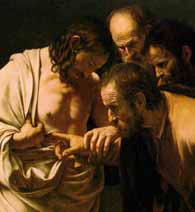|
Many of our Non-Catholic brothers and sisters say that what Jesus was referring to was
the completion of our redemption, i.e. that nothing more was needed, our salvation was
complete. This however is not the case. The New Testament teaches that our redemption was
not complete until Jesus had been raised for our justification" Rom 4:25. Therefore
Jesus should have used those words after his resurrection to make the statement true.
So what did he mean? To answer this question we must look at the events leading up to
the statement. If we go back to Mk 14:12-16 we see that Jesus and his disciples were
celebrating the Jewish feast of the Passover. Passover is the celebration of God
delivering the Israelites from Egypt. As you recall during the night every first born
child died except for those in the Israelites families. The Israelites took the blood of a
lamb, a lamb without blemish or broken bones (Ex 12:5, 46). The lamb was slain and eaten
as a sacrificial meal and the blood was placed on the door post using a hyssop branch.
Like the lamb of the Passover meal Jesus himself is called the perfect lamb (see John
19:33, 36 and Ex 12:46).
Later Jesus stands before Pilate. John states in his Gospel "Now it was the day of
preparation of the Passover, it was about the sixth hour." The sixth hour is
precisely the hour when the Jewish priest begins the slaughtering of the lambs for the
Passover celebration.
John also notes that hyssop was used to bring the wine to Jesus mouth (John 19:29), the
exact branch prescribed in the Passover law to sprinkle the blood of the lamb (Ex 12:22)
Let's go back and take a look at the Passover Feast in more detail. It consists of four
cups of wine. The feast starts with a solemn blessing over the first cup followed by
bitter herbs to remind the Jewish people of the bitterness of Egyptian bondage. The second
cup is drank after the recitation of the "Little Hallel" (Ps 113). The main meal
is then served consisting of the sacrificed lamb and unleavened bread., then the third cup
known as the "cup of blessing." This was then followed by singing of the hymn
known as the Great Hallel (Ps 114-118). Then the fourth cup, the "cup of consumption.
New Testament scholars acknowledge that the last super was the Passover Meal. The cup
that Jesus blessed is the third cup, the "Cup of Blessing." Immediately
following it "they sung a hymn" (Mk 14:26). Paul identified this cup of blessing
with the Eucharistic cup (see 1 Cor 10:16).
What happens next is interesting. Instead of proceeding to the last cup of the Passover
Meal "they went out to the Mount of Olives" (Mk 14:26). Jesus purposely did not
finish the Passover celebration. In fact he purposely exclaimed "Truly, I say to you,
I shall not drink again of the fruit of the vine until that day when I drink it new in the
Kingdom of God" (Mk 14:25). |
The New
Testament teaches that our redemption was not complete until Jesus had been raised for our
justification |

|
 |
This
Is My Body: An Evangelical Discovers The Real Presence
| Author: |
Mark P. Shea |
| Publisher: |
Christendom Press |
| Price: |
$4.95 |
| Pages: |
63 |
| Date: |
1993 |
| Format: |
Soft Cover |
Availability:Usually ships within 1-2 Days |
| Mark P. Shea is a writer living in Seattle, Washington. He
has contributed articles to such periodicals as the New Oxford Review, The Door,
Catholic Digest and Christianity and Literature> "Mr. Shea writes
very much in the tradition of C. S. Lewis. He thinks and writes as clearly as an
Englishman; yet, amazingly, he is an American... If all Christian writers combined these
two virtues - clarity and depth - as well as Mr. Shea does, we would see a great revival
in our confused world."
-Peter
Kreeft
"Mark Shea's little book is gigantic in its call to Christ - the Christ who is
present in the Eucharist. His exploration of the Real Presence is penetrating, uplifting
and challenging."
-Dan O'Neill, Mercy Corps International |
| |
|
|

|
Prayer to the Holy Spirit
Come, Holy Spirit,
almighty Sanctifier,
God of love,
who filled the Virgin Mary with grace,
who wonderfully changed the hearts of the
apostles,
who endowed all Your martyrs with miraculous
courage,
come and sanctify us.
Enlighten our minds,
strengthen our wills,
purify our consciences,
rectify our judgment,
set our hearts on fire,
and preserve us from the misfortunes of
resisting Your inspirations.
Amen. |
| Later in Matthew we see Jesus in the Garden of Gethsemane
where he prayed "going a little farther, he fell on his face and prayed 'my Father,
if it be possible, let this cup pass from me; nevertheless, not as I will, but as thou
wilt" (Mt 26:39). In fact he prayed three times that this cup be taken away. Later
still, when Jesus was heading up to Golgotha "they offered him wine mingled with
myrrh; but he did not take it" (Mk 15:23). As Jesus had stated in Mk 14:25 he did not
drink the fruit of the vine at this point.
When we review the Gospel of John we see that John perceived Jesus paschal suffering as
actually the event whereupon he manifests and enters the Kingdom of Glory (see Jn 3:14,
7:37-39, 8:28, 12:23-33, 13:31)
When we consider all the events surrounding the Passover Meal; John's interpretation of
Jesus entering into the Kingdom of Glory with his suffering; The New Testament statement
that Jesus had to be "raised for our Justification" (which had not occurred at
this point); and Jesus last actions surrounding his statement "It is Finished,"
we must conclude that when he received the vinegar (sour wine) just before he made the
statement he was actually stating that he completed the transformation of the old Passover
Covenant into the New Covenant. "He took the cup, and when he had given thanks he
gave it to them, saying, 'Drink of it, all of you; for this is my blood of the covenant,
which is poured out for many for the forgiveness of sins" (Mt 26:27-28). |
Write to Abell Apologetics at:
webmaster@chooselife.faithweb.com |

|
|
This Page last updated: Tuesday, October 31, 2000
515 people have visited this page
|